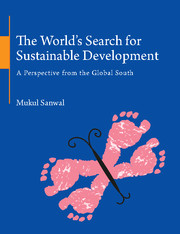Book contents
- Frontmatter
- Dedication
- Contents
- Preface
- Acknowledgments
- Abbreviations
- INTRODUCTION
- 1 Social Dimension of Sustainability
- CONSUMPTION IN AN UNEQUAL WORLD: FRAMING INTERNATIONAL COOPERATION
- CLIMATE POLICY: GLOBAL TO NATIONAL
- SUSTAINABLE DEVELOPMENT: NATIONAL TO GLOBAL
- 12 Conceptual and Institutional Foundation
- 13 Politics within the United Nations
- 14 Limitations of the Building Blocks of Sustainability
- 15 Use of Natural Resources
- 16 Distribution of Natural Resources
- CONSUMPTION IN A MORE EQUAL WORLD: SHAPING SOCIETAL FUNCTIONS
- GEOPOLITICS TO GEOECONOMICS: RURAL–URBAN DIVIDE, RATHER THAN BETWEEN COUNTRIES
- THE ASIAN CENTURY
- Index
16 - Distribution of Natural Resources
from SUSTAINABLE DEVELOPMENT: NATIONAL TO GLOBAL
Published online by Cambridge University Press: 18 December 2015
- Frontmatter
- Dedication
- Contents
- Preface
- Acknowledgments
- Abbreviations
- INTRODUCTION
- 1 Social Dimension of Sustainability
- CONSUMPTION IN AN UNEQUAL WORLD: FRAMING INTERNATIONAL COOPERATION
- CLIMATE POLICY: GLOBAL TO NATIONAL
- SUSTAINABLE DEVELOPMENT: NATIONAL TO GLOBAL
- 12 Conceptual and Institutional Foundation
- 13 Politics within the United Nations
- 14 Limitations of the Building Blocks of Sustainability
- 15 Use of Natural Resources
- 16 Distribution of Natural Resources
- CONSUMPTION IN A MORE EQUAL WORLD: SHAPING SOCIETAL FUNCTIONS
- GEOPOLITICS TO GEOECONOMICS: RURAL–URBAN DIVIDE, RATHER THAN BETWEEN COUNTRIES
- THE ASIAN CENTURY
- Index
Summary
Lifestyles of the urban middle class impose disproportionate burdens on the global ecosystem requiring a policy focus not only on globalized material flows and related scarcity but also on the social, economic and environmental systems that structure society's use and distribution of natural resources. The fundamental drivers and tends are increasingly internationalized through globalization of supply chains so that impacts occur in other parts of the world, and interdependencies and lock-ins require systemic transitions.
Mega-trends and the decreasing stock of natural resources
Human well-being has always been, and will be in the future, dependent on the availability of natural resources such as energy, materials, water and land. Economic development in a globalized world is associated with a rapid increase in the use of natural resources. In 1998, the richest one-fifth of the world's population was responsible for more than four-fifth of consumption expenditure while the poorest one-fifth had to settle for less than one-fiftieth of such expenditure. The 500 million richest people, who constitute only 7 per cent of the world population, are responsible for half of all greenhouse gas (GHG) emissions. In contrast, the poorest 3.1 billion people are responsible for only 5–10 per cent of the total. However, the research and policy focus so far has been on impacts caused by direct interventions into natural systems such as resource extraction, land cover change and fishing in rural areas where the poor live. The effects of consumption in urban areas, such as electricity use in buildings and ecological footprint of food and transport, have been treated as unintended side effects and largely ignored. The degree to which natural resource use affects ecosystem services and causes adverse impacts on the environment depends not only on the amount of resources used, but also on the types of resources used and on the ways in which they are used [UNEP, 2011].
Humans have converted about a quarter of the Earth's potential net primary production, half through direct cropping and the rest through land-use-induced productivity changes, or industrialization and urbanization. The combined impact on natural ecosystems is biggest in North America and Europe. Reflecting this trend, historical large-scale forest loss has stabilized in temperate regions and is decreasing in the tropics, and the net area lost to deforestation annually has halved compared with the forest loss 20 years ago [FAO, 2010].
- Type
- Chapter
- Information
- The World's Search for Sustainable DevelopmentA Perspective from the Global South, pp. 211 - 216Publisher: Cambridge University PressPrint publication year: 2015



